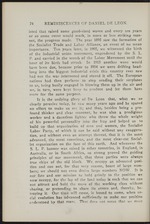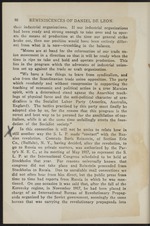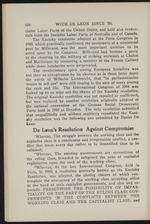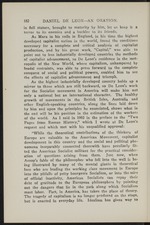| 1 |
 |
“...a prodigious
worker and a dauntless fighter who threw the whole weight
of his powerful personality into the fray and helped us to
build up that organization of men and women, the Socialist
Labor Party, of which it can be said without any exaggera-
tion, and without even an attempt thereat, that it is the most
advanced, the most conscious, and the most clear-cut Social-
ist organization on the face of this earth. And whenever the
S. L. P. banner was raised in other countries, in England, in
Australia, or in South Africa, so strong proved the guiding
principles of our movement, that these parties were always
true chips of the old block. We occupy an advanced posi-
tion and can not, for that very reason, boast of large num-
bers; we should not even desire large numbers NOW. It is
our fate and our mission to hold grimly to the position we
now occupy, for the lay of the land today is such that we can
not attract and hold the mass of the working class without
sharing, or pretending to share its...”
|
|
| 2 |
 |
“...which the advocates of industrial union-
ism set up against the trade or craft organization.
We have a few things to learn from syndicalism, and
also from the Scandinavian trade union opposition. The party
which resolutely and without compromise is supporting the
teaching of economic and political action in a true Marxian
spirit, with a determined stand aganst the Anarchist teach-
ings of physical force and the anti-political character of syn-
dicalism is the Socialist Labor Party (America, Australia,
England). The tactics practised by this party must finally be
adopted also by us, for the reason that this program is the
surest and best way to be pursued for the annihilation of cap-
italism, while it at the same time unfailingly erects the foun-
dation of the Socialist society.
In this connection it will not be amiss to relate how in
still another way the S. L. P. made contact with the Rus-
sian revolution. Comrade Boris Reinstein, of Section Erie
Co., (Buffalo), N. Y., having decided, after...”
|
|
| 3 |
 |
“...104 WITH DE LEON SINCE 89.
cialist Labor Paity of the United States, and held also creden-
tials from the Socialist Labor Party of Australia and of Canada.
The Kautsky resolution adopted at the Paris Congress ia
1900, which practically confirmed the acceptance of a ministerial
post' by Millerand, was the most important question to be
acted upon by the Congress. Millerand had become a party
to the shooting by the military of striking workmen at Chaloa
and Martinique by remaining a member of the French Cabinet
while those butcheries were perpetrated.
The revolutionary spirit among European Socialists was
not then so conspicuous by its absence as in these latter days,
the words of Wilhelm Liebknecht, that to parliamentarize
means to sell out were still ringing in the ears of many among
the rank and file. The International Congress of 1904 was
looked up to to wipe out the shame of the Kautsky resolution.
The original Kautsky resolution was not repealed or reaffirmed,
but was replaced by another...”
|
|
| 4 |
 |
“...of the New World, where capitalism, unhampered by
feudal restraints, was able to press forward to the complete
conquest of social and political powers, enabled him to see
the effects of capitalist advancement and triumph.
As the highest industrially developed country holds up a
mirror to those which are still backward, so De Leons work
for the Socialist movement in America will make him not
only a national but an international character. The healthy
growth of movements in the British Isles, Australia and
other English-speaking countries, along the lines laid down
by him and upon the principles he enunciated, shows what in
the end will be his position in the estimation of the workers
of the world. As I said in 1903 in the preface to the Two
Pages from Roman History, which I wrote at De Leons
request and which met with his unqualified approval:
While the theoretical contributions of the thinkers of
Europe are valuable to the American Movement, capitalist
development in this country and the...”
|
|
